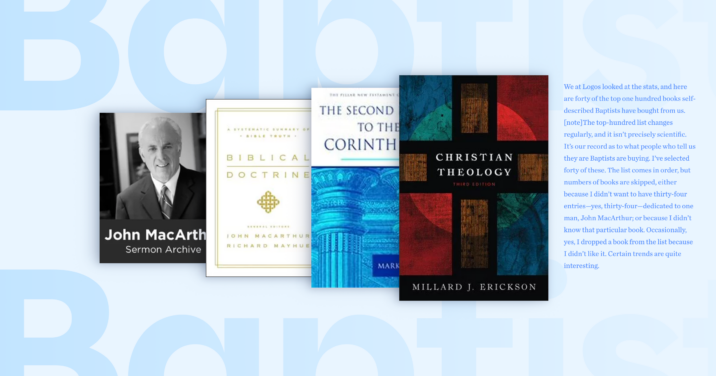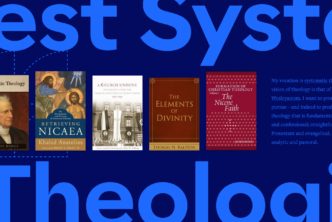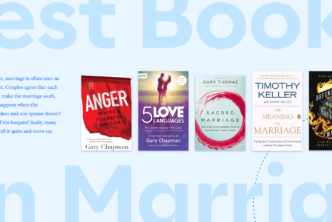We at Logos looked at the stats, and here are forty of the top one hundred books self-described Baptists have bought from us.1 Certain trends are quite interesting.
For example: Pastor John MacArthur utterly dominates the top hundred books for Baptists. This is a bit of an overgeneralization, but the list below is mostly the top hundred with individual MacArthur New Testament Commentary volumes removed (because you can buy the whole set if you want to, so I’m counting it as just one entry!).
Tom Schreiner, as you’ll see, is something of a close second.
Baptists are Bible oriented. So, some other trends: biblical commentaries in general are very popular among Baptists. Even the theologies that are popular are usually biblical theologies—though several systematics definitely made the list.
In the following list, the number at the head is the sales ranking for the book. What follows are some brief comments from me, Mark Ward, a Baptist my whole life (or starting at age eight, when I was baptized); I’m a senior editor for digital content here at Logos.
40. The Pleasures of God, by John Piper
This is one of the most important books in my personal history. Piper takes what could be a dry datum in a list of systematic–theological postulates, the Trinitarian doctrine of perichoresis (the Greek term) or circumincession (the Latin term), and roots it solidly in the Bible, expanding from it to ask about the other things that God himself desires and delights in. A worthy place to start the top-40 countdown.
39. The Deity of Christ, by John MacArthur
I took many other MacArthur books off this list, because they were mostly commentaries that seemed to belong, rather, in one entry rather than dozens. But this MacArthur title is a standalone book. I haven’t read it, but I know what to expect in it: straightforward, confident biblical exposition on a vital theological truth.
38. With the Clouds of Heaven: The Book of Daniel in Biblical Theology (NSBT), by Jim Hamilton
I keep up with this set. I buy all the volumes with my own money, for my personal Logos account. This is one I haven’t read yet, but I’ve seen it mentioned repeatedly. Jim Hamilton is insightful and knowledgeable; I’m excited to dip into this one when I get the chance.
37. The Baptist Heritage: Four Centuries of Baptist Witness, by H. Leon McBeth
I read this in undergrad. It was masterful. I really need to go back through it.
36. Baptism in the New Testament, by George R. Beasley-Murray
Many books on this list are new. That doesn’t mean Baptists read only new books, only that they tend to buy them in Logos. But this book is old(ish), a classic on the topic.
35. Reading the Gospels Wisely: A Narrative and Theological Introduction, by Jonathan Pennington
Jonathan Pennington, a professor at The Southern Baptist Theological Seminary (like a disproportionate number of writers on this list), has written a book on the Sermon on the Mount that I personally found incredibly helpful and insightful. I haven’t read his Reading the Gospels Wisely, but Tom Schreiner recommends it, and he—as you’ll soon see—appears on this top 40 list many times!
34. Finish the Mission: Bringing the Gospel to the Unreached and Unengaged, by John Piper, et al.
I haven’t read this multi-author book. John Piper, Ed Stetzer, and David Platt, however, are names that bring it weight.
33. Believer’s Baptism: The Covenant Sign of the New Age in Christ, eds. Tom Schreiner
Since we’re counting down, this is Tom Schreiner’s first appearance on the list, this time as editor and contributor. But he writes along with some major names in Baptist theology, including Andreas J. Köstenberger, Stephen J. Wellum, Duane Garrett, and Mark Dever. These are heavy, heavy hitters.
32. Suffering and the Goodness of God, eds. Christopher W. Morgan & Robert A. Peterson
Another entry in the Theology in Community series from Crossway, with entries by Bob Yarbrough, John Frame, John Feinberg, Walt Kaiser, and others.
31. The King James Only Controversy: Can You Trust Modern Translations?, by James White
This is a terrible book. Skip right over it and read Authorized: The Use and Misuse of the King James Bible, by—I can’t remember who.
Just kidding. Get both. White’s work is the major book on the topic, and I have personally known many people who were helped to leave the conspiracy theories of KJV-Onlyism through White’s work. White delves into textual criticism, a difficult topic, and one that is not accessible to (in my judgment) most defenders of exclusive KJV use. His book is, therefore, a complement to my book, Authorized, which focuses instead on KJV readability and purposefully leaves textual criticism to the side.
30. Holman Illustrated Bible Dictionary
I don’t tend to use illustrated Bible dictionaries. It’s just not my field of interest. But I love it when preachers and teachers are excited about that field and share relevant images in sermons. And everybody ought to have a Bible dictionary or two. I tend to turn to the Lexham Bible Dictionary out of company loyalty. It’s also free inside the free edition of Logos.
29. Jesus in Trinitarian Perspective: An Introductory Christology, eds. Fred Sanders & Klaus Issler
I’m not sure why this book is here, I must confess. Perhaps because Bruce Ware, Baptist theologian, was one of the contributors? But if you’ve never read anything by Fred Sanders on the Trinity, you must remedy that situation, and you can do so by getting this book.
28. Interpreting the Pauline Epistles, by Tom Schreiner
I used this title in seminary with great profit. I haven’t actually followed Schreiner’s direct methods: I get impatient with the need to label relationships among clauses. I work at a more intuitive level (and hence zero of my books are on this list!). But I do still lay out passages in much the way Schreiner taught me to do—sometimes using the Canvas tool in Logos. This is a classic.
27. God with Us: Themes from Matthew, by D. A. Carson
D. A. Carson deserves more spots on this list. He is a writer whose work I will never cease to give God thanks for. And his commentary on Matthew in the Revised Expositor’s Bible Commentary series is rightly considered one of the very best; I’ve used it repeatedly. This little book is different but complementary: it’s a sweeping theological overview of Matthew.
26. Desiring God, by John Piper
This book had a profound influence on my life. I think—with Don Carson—that Piper’s The Pleasures of God (also on this list) is more important and more foundational than Desiring God. But I needed both. I’m glad Baptists are still reading it.
25. Acts (New American Commentary), by John B. Polhill
I don’t have much direct experience with this volume, so I won’t say more. I just know I’ve come to value having the series.
24. Dominion and Dynasty: A Biblical Theology of the Hebrew Bible (NSBT), by Stephen Dempster
This book by Dempster (I interviewed him about it for the Logos YouTube channel) is a modern classic, one of the relatively few books in this vale of to-do lists that I’ve read more than once, and will probably read again. It’s profound; one of my top favorite books of all time.
23. The Justification of God: An Exegetical and Theological Study of Romans 9:1–23, by John Piper
This was, sort of, John Piper’s first book. His dissertation doesn’t quite count, and it doesn’t sound a great deal like Piper. This book does. It’s not exactly vintage Piper, either; but it’s the exegetically rigorous work that underlies and creates vintage Piper. Piper, like Spurgeon, bleeds Bible. This is a demanding, intense book on a passage vital to the Calvinism–Arminianism debate.
22. The Enduring Authority of the Christian Scriptures, ed. D. A. Carson
I was just reading an essay from this volume last week, one by Peter Williams answering some charges from Bart Ehrman. This is a huge, landmark effort by major evangelical scholars on a huge, landmark issue for Christian faith: the inspiration and authority of Scripture.
21. Spurgeon Commentary: Galatians, by Charles Spurgeon
Spurgeon belongs on this list. And his “commentary” on Galatians—put together from sermons by a personal friend at Lexham who has edited some of my own work—is a brilliant idea. Spurgeon didn’t write a commentary on Galatians (he’s known for his commentary on the Psalms), but he nonetheless offered many insights into the book in his sermons, and these have been collected into a neatly useful volume.
20. The New Testament: Its Background and Message, by David Alan Black & Thomas Lea
I used Carson and Moo’s NT intro in my seminary studies, and I pored over it very carefully a second time for my doctoral comprehensive exams. Matters of New Testament introduction—author, date, purpose, setting, structure, text, etc.—are extremely important building blocks for all work within New Testament studies. To read a commentary intelligently is to know the concerns it’s addressing and the framework it’s assuming. Black and Lea’s New Testament introduction is another worthy (Baptist) effort to acquaint students with these basics.
19. What Is a Healthy Church?, by Mark Dever
I’m a little surprised I didn’t see more Dever (and/or 9Marks) books on the top-forty list. Dever is the preeminent Baptist ecclesiologist. But one thing I’ve noticed about Dever: his Cambridge PhD and his prodigious intellect has not caused him to focus on “scholarly” output—and that is not a criticism. He has dedicated himself to serving the church, to producing books that are often very simple, straightforward, and accessible. This book is an excellent example. Dever, as a pastor, loves to hand out books to his congregants. He writes books that other pastors should use for the same purpose.
18. Fallen: A Theology of Sin, eds. Christopher W. Morgan & Robert A. Peterson
The Theology in Community series, put out by Crossway, includes several notable volumes. This one contains essays by D. A. Carson, Paul R. House, Robert Yarbrough, Douglas Moo, Gerald Bray, Bryan Chapell, and others. Major names on a major topic.
17. 40 Questions about the End Times, by Eckhard Schnabel
The 40 Questions series is truly excellent. It has rapidly established itself as a reliable, accessible resource for all sorts of questions. Honestly, the format is more than half the value. I read a fair number of books each year in a busy life—my general goal is a book a week—and I really love it when authors keep their chapters short.
16. Luke (New American Commentary), by Robert H. Stein
Luke is one of the NAC volumes I regularly turn to. I have repeatedly found it helpful to use the work of Robert H. Stein—yet another name on this list associated with The Southern Baptist Theological Seminary (don’t underestimate the power and importance of institutions, which we lose at our peril).
15. God, Revelation, and Authority (6 vols.), by Carl Henry
Carl F. H. Henry’s magisterial work is, perhaps, more mentioned than read. I have to wonder how many people who buy it in Logos do so with the intention of reading through the entire thing. But one of the values of Logos for me is books like this that—let’s be honest—I’ll probably never read straight through, but can still be useful to me as part of my theological library. I can dip in here and there as needed; the books come up in search results; and (this is no small thing for me) I can look up for myself citations of Henry’s work that are found in other books and read them in context.
14. God’s Indwelling Presence: The Holy Spirit in the Old and New Testaments (NAC Studies in Bible and Theology), by Jim Hamilton
Jim Hamilton is another major name in Baptist biblical studies, one who (like Tom Schreiner, who was Hamilton’s doktorvater) is associated with The Southern Baptist Theological Seminary, where he teaches. Hamilton is a Bible guy: he knows Scripture in detail, and he brings his knowledge of all of Scripture to bear on his presentation of any portion of it.
13. New Testament Theology: Magnifying God in Christ, by Tom Schreiner
It’s Schreiner again. This time with a testamental theology. Honestly, I knew Schreiner was a major figure (I’ve interviewed him about yet another commentary of his), but I’m not sure I put all the pieces together. His work appears in different genres. It’s remarkable.
12. 1 Corinthians (New American Commentary), by Mark Taylor
I don’t have a great deal of personal experience with this commentary; it’s one among others that I’ll check when I do a round-up of opinion on a difficult question. What I find interesting here is that the New American Commentary (and a related series, the NAC Studies in Bible and Theology) pops up so many times on this list. That’s appropriate, given that the NAC is put out by Broadman & Holman, a Baptist publisher. Nonetheless, I don’t ever remember thinking, while reading an NAC commentary, “Oh, how Baptist this is!” I know the NAC instead for its good, solid exegesis.
11. The Second Letter to the Corinthians (Pillar New Testament Commentary), by Mark Seifrid
Baptists love their commentaries. Seifrid actually teaches at a Lutheran school as of this writing, but taught for many years at The Southern Baptist Theological Seminary. D. A. Carson—another favorite name among Baptists—edits the Pillar New Testament Commentary series, another series that shows up in Logos libraries and is very much worth owning.
10. 1 & 2 Peter and Jude (New American Commentary), by Tom Schreiner
Speaking of Schreiner, what can one say? Here he is again, in one of the first commentaries I remember being praised by my own commentary sensei. This comes in a set I bought many years ago in my first Logos library, and one I’ve consulted repeatedly.
9. Galatians (Zondervan Exegetical Commentary on the New Testament), by Tom Schreiner
Tom Schreiner appears twice in the top ten,2 The structure and focus of ZECNT commentaries is unique, and the series has built a lot of good will among commentary readers. Schreiner is able to do, not just teach: the exegetical methods he taught in books like Interpreting the Pauline Epistles (see no. 28 on this list) he employs here, including a detailed visual breakdown of each passage.
8. The King in His Beauty: A Biblical Theology of the Old and New Testaments, by Tom Schreiner
And here’s Schreiner again, writing in a second major genre (both commentary and biblical theology). That’s a remarkable achievement, as was this book.
7. Systematic Theology: Biblical and Historical, by Robert Culver
It takes some chutzpah—a Hebrew word meaning “chutzpah”—to write a systematic theology. It also takes years of one’s life. Theology is an old man’s game. Robert Duncan Culver published his systematic while in his late-eighties. It most definitely gets used and cited; it’s a standard, and it deserves its place near the top of this list.
6. Learn to Read New Testament Greek, by David Alan Black
David Alan Black makes a rather wry observation at the beginning of what he knew to be yet another textbook for teaching New Testament Greek: “I am sure that the call for this book did not arise from the deficiencies of its predecessors.” But incremental advances are still advances. And Black incorporates insights from linguistics into his instruction, something I personally consider very important. I am often asked where to start when studying Greek; I even wrote a little booklet on the topic, and I didn’t mention this volume, because I have not personally used it. But tons of Baptists can’t be wrong.
5. Romans (Baker Exegetical Commentary on the New Testament), by Tom Schreiner
Tom Schreiner is clearly one of the top NT scholars among Baptists, and his Romans commentary is, if often considered second-place to that of Moo’s, still always mentioned in the next breath.
4. NIV Biblical Theology Study Bible Notes, ed. D. A. Carson
I was glad to see this work so high on the list. The real editorial workhorse behind these notes was my respected friend and former fellow student (and church member, as it happens) Andy Naselli. Andy is a machine: he produces a lot of work, and he always has, ever since I’ve known him. But he made a comment once that really struck me: his work writing and editing notes for this study Bible was likely to reach more people than all of his other work combined. The lead name on the volume is actually that of Don Carson, Andy’s mentor, but I always think of it as Andy’s work. Major names in evangelical biblical theology signed on for this project, from T. D. Alexander to Jim Hamilton to Doug Moo.
3. Biblical Doctrine: A Systematic Summary of Bible Truth, by John MacArthur & Richard Mayhue
It’s MacArthur again—but not by himself. This systematic is the work of multiple members of The Master’s Seminary faculty. It is, as the preface says, everything MacArthur fans will expect: biblical, exegetical, systematic, comprehensive, pastoral, and practical.3
2. Christian Theology, by Millard J. Erickson
Millard Erickson’s systematic has been a textbook and a go-to resource for decades now. I used it in seminary myself. What struck me about Erickson was his judiciousness. It could be frustrating to not be told The Right View on any given topic, but in Erickson’s practice this was an important lesson for me to learn: major views tend to exist for good reasons, even if you must ultimately disagree with some of them.
1. John MacArthur Sermon Library
The man, the expositor, the still-living legend. Baptists love his sermons. And his commentaries are (kind of) his sermons. I actually had to remove dozens of MacArthur commentary volumes from this list, lest MacArthur dominate it. But here is a link to the whole set.
A good pride
As a Baptist myself, I’m feeling a little bit of that elusive good kind of pride right now. I really like it that Baptists reach for Bible-oriented books. I like seeing so many commentaries, so many biblical theologies, and some biblical languages books. I’m pleased with and impressed by our Baptist customers’ tastes. They reach for solid and not vapid resources. This, to me, feels like a golden age of good English theological writing, one paralleled mainly—or only—by the time of the Puritans.
Baptists must be right.4
Grow your Baptist resources with these curated libraries
Related articles
- Baptist Bible Study: History, Beliefs, Major Figures, and Resources
- Sermon Preparation Help from Beloved Baptist Pastors
- The Definitive Guide to Christian Denominations
- The top-hundred list changes regularly, and it isn’t precisely scientific. It’s our record as to what people who tell us they are Baptists are buying. I’ve selected forty of these. The list comes in order, but numbers of books are skipped, either because I didn’t want to have thirty-four entries—yes, thirty-four—dedicated to one man, John MacArthur; or because I didn’t know that particular book. Occasionally, yes, I dropped a book from the list because I didn’t like it.
- Remember, I’ve removed duplicate MacArthur entries.
- See page 25.
- This statement has not been evaluated by the Food and Drug Administration and may or may not reflect the opinions of Logos.






